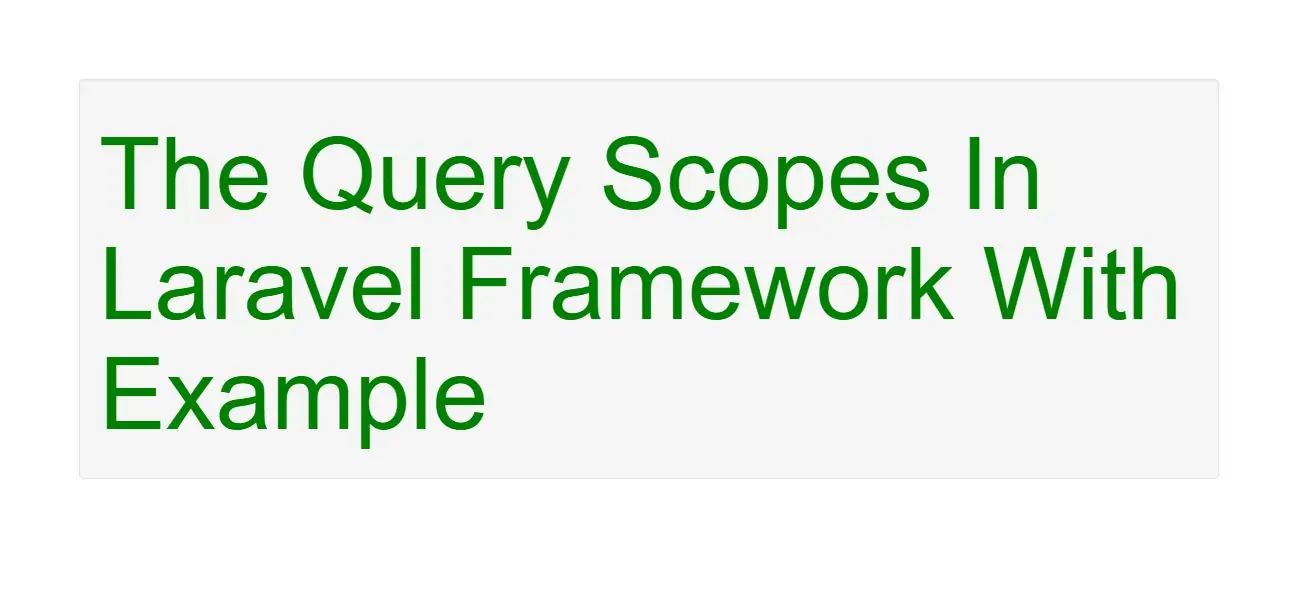
Global Scopes
Global scopes allow you to add constraints to all queries for a given model. Laravel's own soft delete functionality utilizes global scopes to only pull "non-deleted" models from the database. Writing your own global scopes can provide a convenient, easy way to make sure every query for a given model receives certain constraints.
Writing Global Scopes
Writing a global scope is simple. Define a class that implements the Illuminate\Database\Eloquent\Scope interface. This interface requires you to implement one method: apply. The apply method may add where constraints to the query as needed:
<?php
namespace App\Scopes;
use Illuminate\Database\Eloquent\Builder;
use Illuminate\Database\Eloquent\Model;
use Illuminate\Database\Eloquent\Scope;
class AgeScope implements Scope
{
/**
* Apply the scope to a given Eloquent query builder.
*
* @param \Illuminate\Database\Eloquent\Builder $builder
* @param \Illuminate\Database\Eloquent\Model $model
* @return void
*/
public function apply(Builder $builder, Model $model)
{
$builder->where('age', '>', 200);
}
}
Applying Global Scopes
To assign a global scope to a model, you should override a given model's booted method and use the addGlobalScope method:
<?php
namespace App;
use App\Scopes\AgeScope;
use Illuminate\Database\Eloquent\Model;
class User extends Model
{
/**
* The "booted" method of the model.
*
* @return void
*/
protected static function booted()
{
static::addGlobalScope(new AgeScope);
}
}
After adding the scope, a query to User::all() will produce the following SQL:
select * from `users` where `age` > 200
Anonymous Global Scopes
Eloquent also allows you to define global scopes using Closures, which is particularly useful for simple scopes that do not warrant a separate class:
<?php
namespace App;
use Illuminate\Database\Eloquent\Builder;
use Illuminate\Database\Eloquent\Model;
class User extends Model
{
/**
* The "booted" method of the model.
*
* @return void
*/
protected static function booted()
{
static::addGlobalScope('age', function (Builder $builder) {
$builder->where('age', '>', 200);
});
}
}
Removing Global Scopes
If you would like to remove a global scope for a given query, you may use the withoutGlobalScope method. The method accepts the class name of the global scope as its only argument:
User::withoutGlobalScope(AgeScope::class)->get();
Or, if you defined the global scope using a Closure:
User::withoutGlobalScope('age')->get();
If you would like to remove several or even all of the global scopes, you may use the withoutGlobalScope method:
// Remove all of the global scopes...
User::withoutGlobalScopes()->get();
// Remove some of the global scopes...
User::withoutGlobalScopes([
FirstScope::class, SecondScope::class
])->get();
Local Scopes
Local scopes allow you to define common sets of constraints that you may easily re-use throughout your application. For example, you may need to frequently retrieve all users that are considered "popular". To define a scope, prefix an Eloquent model method with scope.
Scopes should always return a query builder instance:
<?php
namespace App;
use Illuminate\Database\Eloquent\Model;
class User extends Model
{
/**
* Scope a query to only include popular users.
*
* @param \Illuminate\Database\Eloquent\Builder $query
* @return \Illuminate\Database\Eloquent\Builder
*/
public function scopePopular($query)
{
return $query->where('votes', '>', 100);
}
/**
* Scope a query to only include active users.
*
* @param \Illuminate\Database\Eloquent\Builder $query
* @return \Illuminate\Database\Eloquent\Builder
*/
public function scopeActive($query)
{
return $query->where('active', 1);
}
}
Utilizing A Local Scope
Once the scope has been defined, you may call the scope methods when querying the model. However, you should not include the scope prefix when calling the method. You can even chain calls to various scopes, for example:
$users = App\User::popular()->active()->orderBy('created_at')->get();
Combining multiple Eloquent model scopes via an or query operator may require the use of Closure callbacks:
$users = App\User::popular()->orWhere(function (Builder $query) {
$query->active();
})->get();
However, since this can be cumbersome, Laravel provides a "higher order" orWhere method that allows you to fluently chain these scopes together without the use of Closures:
$users = App\User::popular()->orWhere->active()->get();
Dynamic Scopes
Sometimes you may wish to define a scope that accepts parameters. To get started, just add your additional parameters to your scope. Scope parameters should be defined after the $query parameter:
<?php
namespace App;
use Illuminate\Database\Eloquent\Model;
class User extends Model
{
/**
* Scope a query to only include users of a given type.
*
* @param \Illuminate\Database\Eloquent\Builder $query
* @param mixed $type
* @return \Illuminate\Database\Eloquent\Builder
*/
public function scopeOfType($query, $type)
{
return $query->where('type', $type);
}
}
Now, you may pass the parameters when calling the scope:
$users = App\User::ofType('admin')->get();